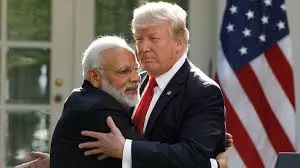Shashi Warrier | The failed peacemaker’s drawing room uprising
My cousin’s Hindi is none too good but with the visuals and the occasional English sound bites he had no trouble getting the general drift of the report. “Is the opinion here for Trump?” he asked

On the twenty-first of January, a young nephew, Rajesh, and his wife, Chhaya arrived on a three-day visit. They live in America, and decided to visit India in January rather than the Christmas-New Year period when everyone else takes their vacations. When they had finished their ablutions, I asked them about the timing of their trip.
“We made up our minds in November,” said Rajesh. “When Trump won the elections, we knew we didn’t want to be in the US for his inauguration on twentieth.”
Because of the difference in time zones, the inauguration was due to happen. I wanted to watch it on TV, but since our visitors have travelled across oceans to avoid it, I changed channels on the TV set to a popular Hindi news channel. No luck. The anchor was going on about how Trump and PM Modi are such great friends, and how things are going to get much better between our two countries.
My cousin’s Hindi is none too good but with the visuals and the occasional English sound bites he had no trouble getting the general drift of the report. “Is the opinion here for Trump?” he asked.
Chhaya and my wife Prita joined us at this point. Chhaya’s eyes were on the TV screen, and she, too, had got the gist of the message. “Wow!” she said. “I didn’t know Trump had such a presence here.”
“It’s because Modi came out in support of him before the 2020 elections,” I said. “If I remember right, he had a slogan that went, ‘Abki baar, Trump Sarkaar,’ or something of the kind.”
“Yes,” said Chhaya. “I remember thinking about whether it constituted foreign interference in elections.”
“Of course it does!” retorted Rajesh. “He’s got no business promoting a candidate in another country. Especially when he’s visiting that country.”
“Look, it was an open statement of support to a large group of people like us,” said Chhaya, “people with roots in India. It wasn’t such a big deal.”
“Of course it was,” said Rajesh. “It was an elected head of the Indian government saying that one US party is better than the other. What else is it but interference?”
“You might call it that,” Prita interjected, “but India’s got to live with how the Democrats interfered with Bangladesh’s government.”
“That wasn’t election interference,” said Rajesh, his voice rising.
“It wasn’t,” said Prita, “it was regime change! That’s worse than interfering in elections.” I could see she was holding herself back because she didn’t want to quarrel with visitors.
“But look,” said Rajesh, “there’s absolutely no proof that the US government had anything to do with the coup in Bangladesh!”
“Depends on what you call proof,” said Chhaya. “We know that the new ‘adviser’ to the Bangladesh governnment, Muhammad Yunus, is friends with the Clintons and other US Democrats. And Yunus introduced a known Islamist to Clinton, on a public platform, as the man who orchestrated the regime change.”
“We’ve had to live with the consequences,” Prita added. “Hindu genocide, economic downturn, tie-ups with Pakistan, and unrest all over our east… That’s why Indians are glad Trump is back. He’s already planning to cut some of the aid to Bangladesh and Pakistan.”
“Yes,” said Chhaya, “But there was no way Modi could have known five years ago that the Democrats would do something like this. Unless he’s prescient…”
“He’s not prescient,” said Prita. “But the US government has a history of stirring up trouble all over the world, and Trump was the exception. He didn’t start any wars while he was President the first time.”
“That’s because he didn’t have a foreign policy,” said Rajesh. “He used to treat political negotiations like business deals. Like Chhaya said, he treats it all like business and isn’t interested in foreign because it doesn’t generate a quick buck! And we’re going to see the consequences of that very soon!”
“Of course he has a foreign policy,” said Chhaya. “He’s got the Chinese in his sights, unlike the Democrats! Look at what he plans to do in Greenland and Panama, where the Chinese are trying to take over the Canal!”
Voices were rising along with tempers, and I feared there’d be a full-scale argument soon. But I didn’t want to offer an opinion, firstly because I don’t really know much about the subject, and, secondly, because I didn’t want to inflame tempers further. “Look,” I said, “there are good and bad sides to all political choices, and all kinds of consequences, so let’s not get carried away…”
As usual with most of my social initiatives, it didn’t seem to work. All three debaters turned on me angrily even before I finished my sentence. Chhaya led the way. “But you have to take a stand, Uncle!” she said. “How can you refuse to vote in an election? It’s your biggest contribution to democracy!”
Rajesh tried to finish it off. “You can’t hide from the world any more, Uncle! You just don’t have principles, which is why you find it so hard to decide!”
Prita, as usual, had the last word. “If you’re not careful,” she told me, “you’re going to fall off the fence, and, like Humpty Dumpty, no one will be able to put you back together!” She took the TV remote and announced that she planned to watch a popular English serial. All three of them turned their attention to the TV in unison. They seemed to be giving me the cold shoulder, so I left. My last thought as I went was that I had at least succeeded in getting the three of them to agree how hopeless I was!
